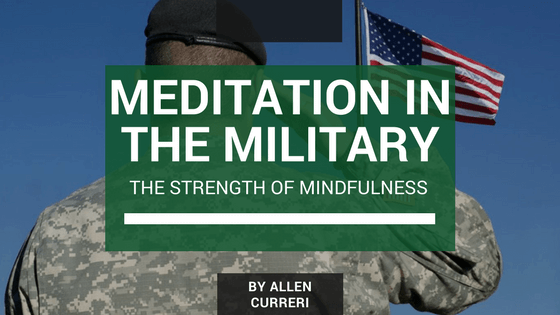Many of us wouldn’t think to associate the battlefield prowess drilled into instinct, nor the regimented, pragmatic mindset of a soldier with the peaceful stoicism and abstract self-mastery which meditating gurus exude. However, there does exist a characteristic common to both: simple in concept, but difficult to achieve.
Strength is what drives an effective unit, just as strength is what a mindfulness master looks for within their self. Such strong commonality cannot be ignored; in fact, military leaders have started to recognize mindfulness as an essential component of any soldier’s arsenal; many military heads now see the benefits of meditation as a sort of armor, offering units a cohesive, fortifying mind-shield which outstrips even the hardest Kevlar.
Mindfulness, or a calm, unbiased acknowledgement of present mental and physical circumstance, has proven to be effective in preserving the mental health of soldiers both pre- and post-tour. Soldiers are called to leave friends, family and all familiarity behind; as such, no one is more aware than soldiers of the fact that their lives are actively at risk. The stress soldiers wrestle with before and following service is a base human reaction. It can’t be drilled out, but it can be coped with.
According to a study conducted by a University of Miami, headed by Dr. Amish Jha, and funded by the U.S. Army Medical Research and Material Command, regularly practicing mindfulness meditation acts as strength conditioning for the mind, fortifying soldiers’ coping abilities when faced with situations of extreme intensity and stress, while also offering a holistic boost to mental sturdiness and flexibility.
The study, called the STRONG project, conducted brainwave scanning in order to demonstrate if and how mindfulness training improves situational awareness, especially during extreme circumstances. The research examined 75 soldiers divided into three study groups, two of which received MMFT, or Mindfulness-based Mind Fitness Training.
Results showed that keeping a regimen of daily mindfulness exercise raises mood and cognitive function, with gains in stress management and problem solving skills apparent after as few as 8 (cumulative) hours of training. “I would like to emphasize that these practices are powerful, but that they only work if they are exercised daily,” said Jha.
An organization as regimented and no-nonsense as the United States Military vouching for the benefits of mindfulness and meditation certainly seems to indicate a shift towards a culture of acceptance concerning a practice once lumped with homeopathy and other Aquarius Age snake oil; however it’s increasingly difficult to dispute the growing body of evidence in support of the practical brain benefits which mindful meditation offers.


